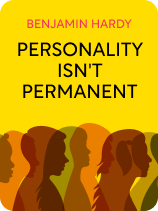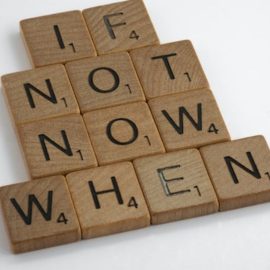

This article is an excerpt from the Shortform book guide to "Personality Isn't Permanent" by Benjamin Hardy. Shortform has the world's best summaries and analyses of books you should be reading.
Like this article? Sign up for a free trial here.
How do you choose a goal to pursue in life? What are some things you should consider when deciding what to aim for?
According to psychologist Benjamin Hardy, there are two considerations you should make when choosing your goal: It should require you to change your personality in the ways you want, and you should commit yourself to complete the goal at any cost.
Here’s how to choose a goal to go after, according to Benjamin Hardy.
#1: Choose a Goal That Requires You to Become Your Optimal Self
In his book Personality Isn’t Permanent, psychologist Benjamin Hardy explains how to choose a goal to pursue. Hardy says that your primary goal should be one that requires you to change your personality into the one you want. While a goal that you could accomplish without becoming your optimal self will still help you grow in some ways, a goal you cannot meet without becoming your optimal self is more likely to produce the kind of change you want.
Let’s say you want to become a kinder, more balanced, and loving listener. An example of a single primary goal to turn you into this person is becoming a therapist. Because you can’t be an effective therapist without these qualities, you’ll have to become the person you want to be to meet your goal.
#2: Commit to Completing Your Goal at Any Cost
Hardy instructs that in addition to choosing your primary goal, you also need to commit to completing the goal, not just trying to. He asserts that everyone has the power to meet their goals—whether or not you’ve met your goal is only the result of whether you’ve tried hard enough. He says that there are no obstacles that are too big for you if you’re willing to do whatever it takes.
If you only commit to trying, you acknowledge that if the going gets too tough, you’ll give up. Committing to completing the goal, on the other hand, means that failure is not an option and that you’ll do whatever it takes to succeed. This, Hardy argues, is the only guaranteed way to meet your goal.
| The Downside of 100% Commitment to a Life-Altering Goal While choosing a single primary goal completely based on becoming your optimal self and putting in all the effort necessary to achieve it can certainly lead to growth, it may come with downsides. In Four Thousand Weeks, Oliver Burkeman notes that when you base your life completely around meeting your goals and make productivity a central part of your personality, your quality of life decreases. When you’re constantly focused on accomplishing things and making progress, he says, you dedicate more time to completing tasks than doing the things that matter most—like spending time with loved ones and enjoying beauty and recreation. Goals are still important, but you shouldn’t form your whole identity around completing them. Giving yourself permission to accomplish less and dedicating time to doing things out of pure enjoyment, he argues, is necessary for feeling fulfilled. |

———End of Preview———
Like what you just read? Read the rest of the world's best book summary and analysis of Benjamin Hardy's "Personality Isn't Permanent" at Shortform.
Here's what you'll find in our full Personality Isn't Permanent summary:
- How personality is not fixed, but fluid and changeable
- How the narratives you tell yourself dictate what you’re capable of
- How to change your personality to become your optimal self






